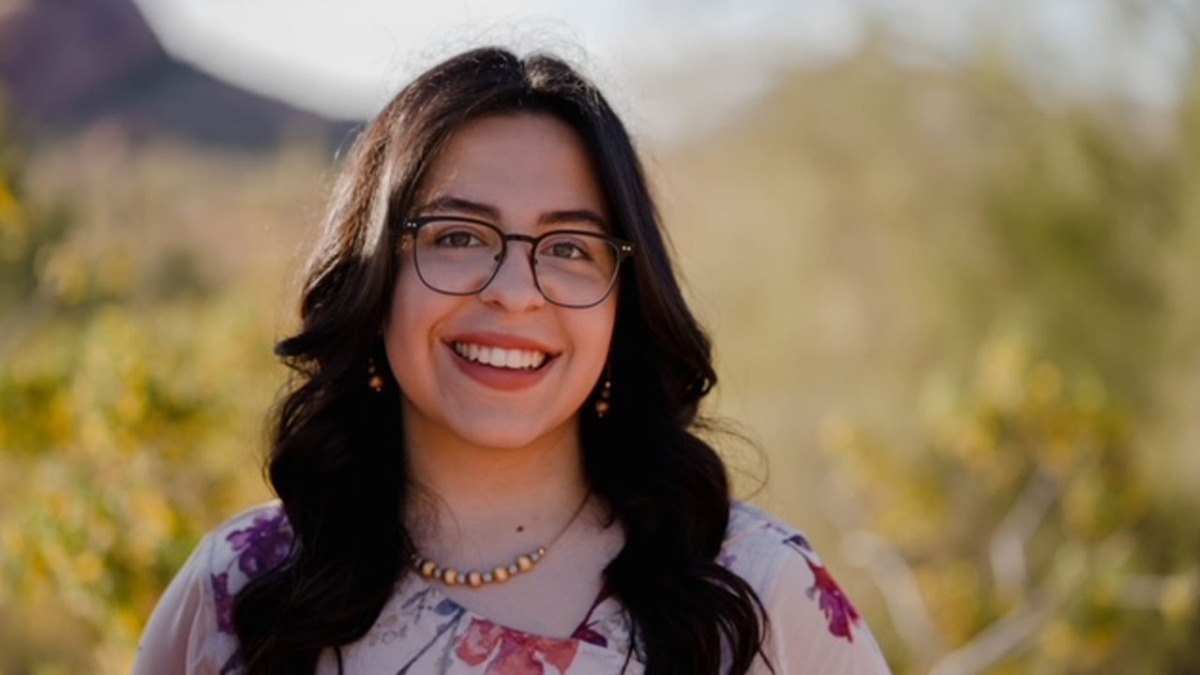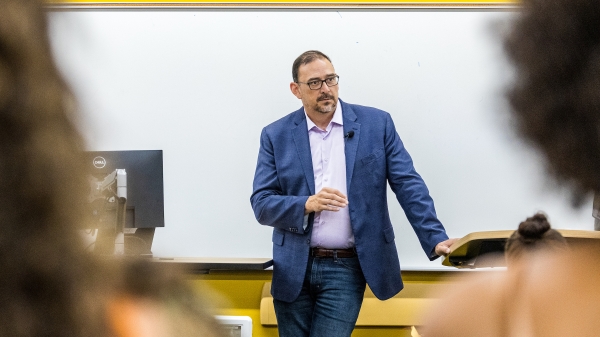Cronkite graduate driven by passion for storytelling

“I don't think there's a cooler job out there in the world than being a journalist. Every single day of my life I'm going to be making new connections, and I'm going to be going to new places and meeting new people,” said Autriya Maneshni, who will give the student convocation speech at the Cronkite School's ceremony.
Editor's note: This story is part of a series of profiles of notable spring 2023 graduates.
When Autriya Maneshni arrived in the United States in 2009, she learned how to speak English from watching news programs, including those on Arizona PBS.
Years later, Maneshni is set to embark on her own journalism career after attending the Walter Cronkite School of Journalism and Mass Communication and reporting for the news division of Arizona PBS, Cronkite News.
Maneshni, who is from Iran, is preparing to graduate from the Cronkite School and Barrett, The Honors College in May with her Bachelor of Arts degree in journalism and mass communication.
She was named an outstanding on-campus undergraduate student and was invited to join Kappa Tau Alpha, the national honor society for journalism and mass communication. She is also the Barrett Honors College’s 2023 Outstanding Graduate. Maneshni will give the student convocation speech at the ceremony.
Aside from reporting for Cronkite News, Maneshni was the station manager of Blaze radio, Arizona State University’s college radio station. Blaze was named the best college radio station in the U.S. by The Princeton Review last year.
“I realized really quickly that I love storytelling, and I think journalism is such an incredible profession to be in,” Maneshni said.
Maneshni’s fondest memories include recording a five-episode podcast to complete her undergraduate thesis for Barrett. The podcast focused on what objectivity looks like in the 21st century.
She also reflected on working on a story for Cronkite News about a group of Hopi women who were translating election material to the Hopi language. The story took second place in the Radio Feature Reporting Category at the 2023 Broadcast Education Association’s (BEA) Festival of Media Arts contest.
Maneshni also won the BEA’s “Best of Festival” prize for her story “Switch Lab,” a piece about high school students who built a road-worthy electric vehicle as part of a class. The “Best of Festival” prizes are the highest honors awarded at the festival.
“I don't think there's a cooler job out there in the world than being a journalist. Every single day of my life I'm going to be making new connections, and I'm going to be going to new places and meeting new people,” Maneshni said.
Question: What’s something you learned while at ASU — in the classroom or otherwise — that surprised you or changed your perspective?
Answer: Something that shocked me was learning just how much journalists use social media. I didn’t realize it before, but I learned that sometimes the best way to connect with your audience is through your use of social media. I didn’t used to be a big Twitter person before, but now it’s one of my go-to social media platforms for journalism.
Q: Why did you choose ASU?
A: I'm very big on school spirit. In high school, I was always the dorky kid that would dress up for every single spirit day and was involved so much in that high school culture. I was in love with it, and I think ASU is such a great place for that. We take great pride in being Sun Devils. It was just such a welcoming atmosphere. I remember when I went to orientation, and I had the best time of my life. My tour guides were so much fun, and they were so excited to welcome you to campus. So I think that was a huge factor. Everyone was very prideful of the school and where they come from. I also really wanted to be in a school where there's just so much to do.
Q: Which professor taught you the most important lesson while at ASU?
A: The professor that immediately comes to my mind was my community engagement professor, Celeste Sepessy. She taught me a whole new way to do journalism. And she really took me away from this kind of formulaic journalism that I was stuck on for so long. She told me that some of the best stories that a person can write is to take the journalist away and be a human being, and just sit there and listen to people. She said a huge part of our job is filled with so much talking and going into an interview or a story with a certain idea in your mind and, really, missing that big picture. So listening to the community is so important because half the time, they're going to be the ones that are actually going to give us the story ideas.
Another professor that stands out is my current Cronkite News Director Allysa Adams. She always tells me to stand up for what I believe in and to chase what I want. She tells me not to be afraid of whatever stands in my way. She really made me feel like I belong on TV and that people like me belong on TV, and she really encouraged me to keep my personality as is and not change for anyone. Plus, her mentorship and guidance is the reason I’ve decided to choose TV reporting as a career.
Q: What’s the best piece of advice you’d give to those still in school?
A: This is going to sound so cliche, but trying something new. Going out of your comfort zone is huge. I started out doing audio, but I decided to give TV reporting a shot. I still remember the first time I picked up a camera and a tripod, and I sat there and I thought to myself that this is maybe the hardest thing I’ve ever had to learn. My back was hurting from the heavy tripod, and I was sweating in the 110-degree heat trying to cover an event. And I was like, I can’t do this. But I realized I just have to give things some time, because now, using the cameras has become second nature to me. Trying new things and giving yourself the time to adjust is so important. I think our society is so fast-paced, right? We expect results so quickly, and I think we have those expectations for ourselves. I think we have an expectation for ourselves to be perfect immediately and get it right on the first try, but there has to be some grace and there has to be an adjustment period and I had to teach myself that.
Q: What was your favorite spot on campus, whether for studying, meeting friends or just thinking about life?
A: The gem of downtown Phoenix is City Cafe (City Central Coffee) in the University Center. I cannot stress this enough. I love this coffee shop and P.O.D. Market so much. It is amazing. Their coffee is inexpensive, and they never have long lines. They have punch cards so you could even get free coffee. And their workers are some of the sweetest people I have ever met in my life. They're so kind, and they're always asking about my day. I'm a regular, and they know me. I remember the first time I discovered City Cafe, and it felt like I was a kid on Christmas morning. I was actually live-tweeting campus locations for a JMC 305 assignment when I stumbled upon this place. I am a huge City Cafe advocate.
My other favorite spot is the Bill Austin Radio Studio. I love being in the studio. I love getting to close the door and play my favorite Iranian songs for 30 minutes. It's such a vibe, and it's a great little home away from home because I'm playing all my Iranian music and it makes me feel so cool and special.
Q: What are your plans after graduation?
A: I am headed off to Binghamton, New York. I will be a multimedia journalist for WBNG 12 News, which is their CBS affiliate. It’s a real full-circle moment because I interned for KPNX 12 News here, and now I'm going to be working for another 12News again.
Q: If someone gave you $40 million to solve one problem on our planet, what would you tackle?
A: I would try to solve the way that immigration works and especially for migrants. I was an immigrant myself. I had a very easy immigration process unlike a lot of other people. I was very lucky and very fortunate. But I know that a lot of people don't have that luxury. If I had the money, I would make a program where it would be easy for everyone to qualify, whoever wanted to move here without having to worry about all of the hardships that come with it. Because immigration and immigrating somewhere shouldn't cost an arm and leg. Everybody has a dream, and everybody wants to achieve their dreams and some dreams are easier to achieve here in America, speaking for myself.
Written by Sierra Alvarez
More Law, journalism and politics

New report documents Latinos’ critical roles in AI
According to a new report that traces the important role Latinos are playing in the growth of artificial intelligence technology…

ASU's Carnegie-Knight News21 project examines the state of American democracy
In the latest project of Carnegie-Knight News21, a national reporting initiative and fellowship headquartered at Arizona State…

Arizona secretary of state encourages students to vote
Arizona Secretary of State Adrian Fontes looked right and left, taking in the more than 100 students who gathered to hear him…